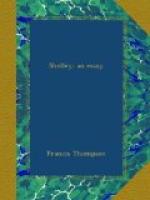We spoke of the purity of Shelley’s poetry. We know of but three passages to which exception can be taken. One is happily hidden under a heap of Shelleian rubbish. Another is offensive, because it presents his theory of Free Love in its most odious form. The third is very much a matter, we think, for the individual conscience. Compare with this the genuinely corrupt Byron, through the cracks and fissures of whose heaving versification steam up perpetually the sulphurous vapours from his central iniquity. We cannot credit that any Christian ever had his faith shaken through reading Shelley, unless his faith were shaken before he read Shelley. Is any safely havened bark likely to slip its cable, and make for a flag planted on the very reef where the planter himself was wrecked?
* * * * *
Why indeed (one is tempted to ask in concluding) should it be that the poets who have written for us the poetry richest in skiey grain, most free from admixture with the duller things of earth—the Shelleys, the Coleridges, the Keats—are the very poets whose lives are among the saddest records in literature? Is it that (by some subtile mystery of analogy) sorrow, passion, and fantasy are indissolubly connected, like water, fire, and cloud; that as from sun and dew are born the vapours, so from fire and tears ascend the “visions of aerial joy”; that the harvest waves richest over the battlefields of the soul; that the heart, like the earth, smells sweetest after rain; that the spell on which depend such necromantic castles is some spirit of pain charm-poisoned at their base? {10} Such a poet, it may be, mists with sighs the window of his life until the tears run down it; then some air of searching poetry, like an air of searching frost, turns it to a crystal wonder. The god of golden song is the god, too, of the golden sun; so peradventure song-light is like sunlight, and darkens the countenance of the soul. Perhaps the rays are to the stars what thorns are to the flowers; and so the poet, after wandering over heaven, returns with bleeding feet. Less tragic in its merely temporal aspect than the life of Keats or Coleridge, the life of Shelley in its moral aspect is, perhaps, more tragical than that of either; his dying seems a myth, a figure of his living; the material shipwreck a figure of the immaterial.
Enchanted child, born into a world unchildlike; spoiled darling of Nature, playmate of her elemental daughters; “pard-like spirit, beautiful and swift,” laired amidst the burning fastnesses of his own fervid mind; bold foot along the verges of precipitous dream; light leaper from crag to crag of inaccessible fancies; towering Genius, whose soul rose like a ladder between heaven and earth with the angels of song ascending and descending it;—he is shrunken into the little vessel of death, and sealed with the unshatterable seal of doom, and cast down deep below the rolling tides of Time. Mighty meat for little guests,




